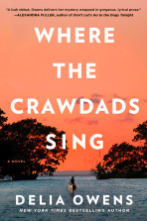As night fell, Tate walked back toward the shack. But when he reached the lagoon, he stopped under the dark canopy and watched hundreds of fireflies beckoning far into the dark reaches of the marsh. Way out yonder, where the crawdads sing.
I had to wait a few months to get Where the Crawdads Sing from the library – this is definitely a book with a lot of buzz – but despite its hype, its long list of four and five star reviews on Goodreads, and Reese Witherspoon's stamp of approval on the cover, this read fell totally flat for me. It started with a lot of promise – a little girl is abandoned in the marsh by her family one by one, and as we watch her growing up and taking care of herself in one timeline, a murder investigation and courtroom drama plays out in another – and then it all fizzled out into bad romance, bad mystery, bad storytelling. Just not for me.
The story is set in the North Carolina coastal marshlands, and in the beginning, I thought that what author Delia Owens got right was the nature writing:
Marsh is not swamp. Marsh is a space of light, where grass grows in water, and water flows into the sky. Slow-moving creeks wander, carrying the orb of the sun with them to the sea, and long-legged birds lift with unexpected grace – as though not built to fly – against the roar of a thousand snow geese.But eventually, as Kya – alone in her shack in the marsh from the age of seven – becomes a keen observer of the nature around her (and after being taught to read by a former friend of her long-gone brother, she becomes an educated expert on the local flora and fauna), it became cringe-worthy to me the way that Kya could relate all human behaviour to what she observes in the critters of the marsh. Also annoying to me: that Owens couldn't have someone cook or send out for a meal without listing the five items on their plate, and I hated the amount of poetry that Kya recited in her head; would eventually skip over the stanzas. And the metaphorical language that I thought suited the nature writing felt overblown when used elsewhere:
• Soon after they arrived, he took up drinking and poker at the Swamp Guinea, trying to leave that foxhole in a shot glass.And, okay, I can accept that despite going to school for one day of her life, with all her solitary hours to devote to reading and observations, Kya could basically teach herself college-level biology, but I couldn't buy that the first time she's alone with a boy she has a crush on and he points out an interesting shell, this is the reply of a conversation-avoiding hermit:
• Kya was rigid at first, not accustomed to yielding to hugs, but this didn't discourage Mabel, and finally Kya went limp against the comfort of those pillows.
• Kya leaned over gently, as if to kiss a baby. The microscope's light reflected in her dark pupils, and she drew in a breath as a Mardi Gras of costumed players pirouetted and careened into view. Unimaginable headdresses adorned astonishing bodies so eager for more life, they frolicked as though caught in a circus tent, not a single bead of water.
It's an ornate scallop, Pecten ornatus. I only see them rarely. There are many of that genus here, but this particular species usually inhabits regions south of this latitude because these waters are too cool for them.I found the writing itself to be clunky and overwrought, and once Kya was old enough to yearn for romance, the narrative went to uninteresting (to me) places. And I don't even want to talk about the overall plot and the dissatisfying ending; don't want to talk about the shallow characterisations and improbable developments. This just wasn't for me, but I will allow that is is apparently of wide appeal.

